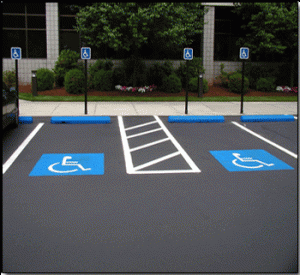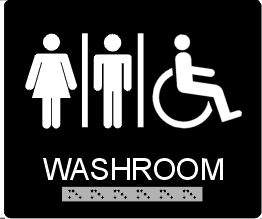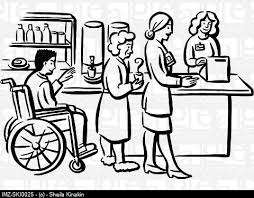Parking:
1. If you do not have a parking decal for the parking space do NOT park in spaces marked with the International Symbol of Accessibility (as shown in photograph). Even if you think you are only stopping for a few minutes do not stop there unless you have the decal. These spaces are limited and in high demand by people who require them.
2. Not all disabilities are visible, do not assume a person does not need the space based on their appearance. People with invisible disabilities often experience attacks by those who believe they are looking out for the people who “really need” the accessible space, but there are people with invisible disabilities who do require the accessible space for mobility or agility reasons.
3. If someone parks in a space without a decal, don’t immediately go into attack mode; ask if they forgot to put up their decal. It is illegal to drive with the decals hanging from your mirror and some people simply forget to put their decal up.
4. If, after asking if they’ve forgotten to put up their decal, they admit they don’t have a decal, explain to them, in a polite manner, the importance of the spaces. Some reasons for needing the accessible spaces include: people who have wheelchair accessible vans and need the additional space to accommodate their lift, people who need the parking spaces closest to the door due to mobility or agility issues, and people in wheelchairs who are are below eye level and therefore in more danger in parking lots where drivers often only look at eye level.
Washrooms:
1. Please do not use the washrooms marked specifically for people with disabilities unless you, yourself, have a disability. The only other two groups who should use these washrooms are: families, particularly those with strollers or parents with children of the opposite sex, and people who are transgendered, who might not feel safe in the men or women washrooms.
2. If there is a large stall marked for people with disabilities in the general washrooms, it is okay to use the accessible stall if all the other stalls are in use. If there are other stalls and you do not need the accessible features in the larger stall, use one of the smaller stalls.
3. If, while waiting in a line, you see a person with a mobility device, it is polite to extend the courtesy of letting them go to the front of the line to wait for the larger accessible stall (as their mobility aid won’t fit in any other stall), or to let them know when the accessible stall is available.
4. People with invisible disabilities sometimes require the use of the accessible washroom, whether it be because of the raised toilet seat or the grab bars, so please don’t automatically assume that a person without a visible disability does not need the accessible features.
Personal Space/Mobility Devices:
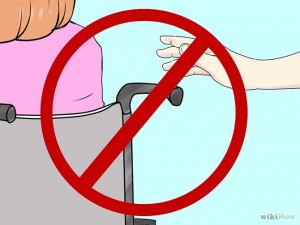
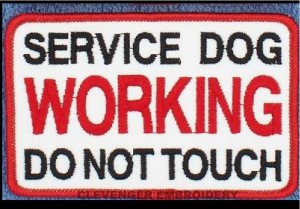 Please remember that a person’s mobility device is part of their personal space. Do not lean on or touch a mobility device. Never move a mobility device without first asking for and receiving permission. Do not place items on a mobility device. Do not rest feet or hands on a mobility device. Accept that a mobility device should be treated as an extension of a person’s body. This rule is also applicable to all service dogs. The dogs are considered as part of the personal space of the person who employs them. Service dogs are working dogs and need to be focused on their task, so do not distract the dogs, pet the dogs, or talk to the dogs, no matter how cute they may be.
Please remember that a person’s mobility device is part of their personal space. Do not lean on or touch a mobility device. Never move a mobility device without first asking for and receiving permission. Do not place items on a mobility device. Do not rest feet or hands on a mobility device. Accept that a mobility device should be treated as an extension of a person’s body. This rule is also applicable to all service dogs. The dogs are considered as part of the personal space of the person who employs them. Service dogs are working dogs and need to be focused on their task, so do not distract the dogs, pet the dogs, or talk to the dogs, no matter how cute they may be.
Communication:
1. Speak directly to people with disabilities. Don’t talk to their companion or assistant unless directed to do so.
2. Don’t slow your speech or speak louder unless requested.
3. Don’t assume that because a person has a visible disability they will have a hard time understanding you. Speak as you would to anyone else.
Line-ups:
Please do not take advantage of cashiers not seeing people in wheelchairs to skip ahead of them in lines. If a cashier has not seen the person please indicate that they were there first. And, again, please remember that a mobility device is personal space so even if you’re tired you should not lean on or rest a limb on or place items on a person’s mobility device.
Thank you for considering these etiquette tips as you shop for the holiday season. The malls are already nutty at this time of the year so civility is appreciated.
